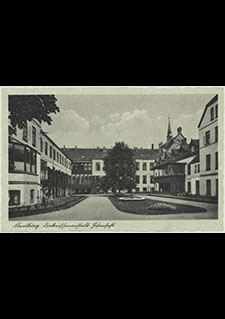Origins and Theological Formation in Flensburg
Hans Christian Asmussen was born on August 21, 1898, the youngest child of Flensburg school headmaster Jes Georg Asmussen and his wife Elise. His upwardly mobile family’s conservative Christianity had two roots: It was shaped by ancestors’ deep rural piety on the one hand and had recently been strongly defined by the deaconess house in Flensburg and its director, Pastor Emil Wacker (1839–1913).
Wacker was a charismatic revival preacher and had great impact on Fördestadt’s strict Lutheran Christianity. The circle of educators Wacker gathered around himself for his missionary projects also included Headmaster Asmussen.
After his father had died of cancer in 1914 and his eldest brother had fallen in World War I, Hans Asmussen decided to serve in the military himself (1917). Like many of his contemporaries, his National Conservative views and orthodox Lutheran piety coalesced into fervent enthusiasm for the war.
In 1919, Asmussen began pursuing a degree in theology in Kiel and immediately established a circle of likeminded individuals, the “League of Lutheran Brethren”, in order to combat the prevalent liberal theology. In 1920, the group briefly switched to the University of Tübingen where they were soon known as the archconservatives from Flensburg.
Upon passing his exam at the University of Kiel in 1921, Asmussen served his vicarage at the deaconess house in his hometown, which subsequently took him on as an assistant pastor until 1925. He found ministry to the ill and dying to be a practical counterbalance to academic theology: One abandons some theological nonsense, and one learns to pray, he wrote.
Source / title
- © Photo: Th. Thomsen, Flensburg

